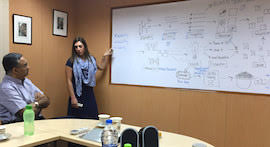WDI Perspective: Design Thinking for Entrepreneurs
Tuesday, June 28, 2016
For Meghan Sheehan, having “a beginner’s mindset – to assume you know nothing,” was a great way to approach a complex problem in a far different culture and economic context than her own.

Sheehan and fellow MBA students applied that perspective, a defining principle of design thinking, when they embarked on a recent consulting project to support local entrepreneurs in India. WDI’s Education Initiative sponsored the students from the University of Michigan’s Ross School of Business as part of the Multidisciplinary Action Project (MAP) program.
The team, which also included Jamyle Michael, Holly Price, and Aaron Steiner traveled to India to assist the Aparajitha Foundation, a community development organization based in Madurai.
MAPs provide MBA students with on-the-ground business analysis, application, and collaboration skills. WDI-sponsored projects apply their focus to building the capacity of small and medium-sized enterprises and those supporting them in low- and middle-income countries. Through MAP, host organizations like Aparajitha receive top-notch deliverables and data-driven recommendations from the team of students.
Aparajitha’s entrepreneurship development work equips local entrepreneurs with the skills needed to attain positive business results for themselves and their communities, and recognizes that businesses and entrepreneurs alike need to be developed. Aparajitha has hosted 10 MAP teams from Michigan Ross. This was the first to focus specifically on entrepreneurship.
During their two weeks in India, the MAP team conducted primary and secondary research focused on how Aparajitha can enable entrepreneurs to be more successful. The studentsconducted interviews with stakeholders and 27 entrepreneurs that helped shape their approach and recommendations.
The team compiled a 66-page final report and presented their findings by video conference to Bharath Krishna Sankar, their supervisor at Aparajitha. The student team developed profiles of six personas of typical Madurai entrepreneurs, identified eight areas of entrepreneur development needs, catalogued 30 modes of delivering training to meet these needs, mapped Madurai’s entrepreneurial ecosystem map, and clarified Aparajitha’s entrepreneur-coaching role within this local ecosystem.
One of the team’s faculty advisors, WDI President Paul Clyde, was pleased with the project’s findings.
“The team was asked to start with a blank slate and determine the best way to develop entrepreneurs,” he said. “This was a broad task that they poured themselves into, never taking a shortcut. Their final product was useful not only in its specific application to Madurai, but also in its approach.”
The team was encouraged by their advisors to draw on best practices and models, but more importantly to listen and think creatively. Though academic frameworks and stakeholder advice informed the team’s report, their on-the-ground interviews drove their recommendations and secondary research validated these findings.
Several team members appreciated having the flexibility to create a path based on their research and informed by what they have learned at Ross, without being anchored by convention.
“We referenced things from our core (curriculum), we referenced things from our prior careers, we learned from each other, and so through all of those pieces, it truly was multidisciplinary,” team member Price said.
Deploying these multidisciplinary tools within a new cultural context adds additional layers of learning. For example, the Madurai interviews revealed that entrepreneurial failure carries different cultural meaning in India than in the United States, where it is often viewed as a mark of experience rather than incompetence.
“The experience in Madurai redefined what an entrepreneur and entrepreneurship is,” team member Michael said. “These definitions will continue to evolve as we grow to learn more about international business and cultural differences.”
Meeting with so many entrepreneurs in a short amount of time provided the MAP students context for exploring what entrepreneurship is all about – and helped develop their own career interests.
“It felt like an intense study in what their challenges were, what made them successful, what they thought was success,” Price said. “I am interested in entrepreneurship as a career path, and this project gave me more confidence in that.”
Steiner agreed. “This gives me incredible new perspective on what it means to be an entrepreneur,” he said.
For the Aparajitha team, learning to work contextually and collaboratively – and make recommendations that support local organizations and create positive social impact – exemplifies what MAP projects seek to offer.
“The opportunity to go to an emerging market, to learn in an environment that’s completely foreign – to be operating culturally, socially, linguistically in a place that’s totally different from what you’re used to – I won’t have any greater experience in my life to learn, to push myself in so many ways at the same time,” Steiner said. “It will be unmatched in terms of learning experiences.”
In addition to the project in Madurai, WDI’s Education Initiative sponsored spring MAP projects in Georgia, Kosovo and Morocco.
This article was written by Nathan Rauh-Bieri, the Program Coordinator for WDI’s Education Initiative.
